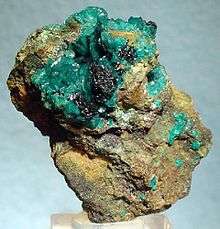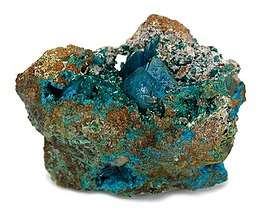Liroconite
Liroconite is a complex mineral: Hydrated copper aluminium arsenate hydroxide, with the formula Cu2Al[(OH)4|AsO4]·4(H2O). It is a vitreous monoclinic mineral, colored bright blue to green, often associated with malachite, azurite, olivenite, and clinoclase. It is quite soft, with a Mohs hardness of 2 - 2.5, and has a specific gravity of 2.9 - 3.0.

| Liroconite | |
|---|---|
 | |
| General | |
| Category | Arsenate minerals |
| Formula (repeating unit) | Cu2Al[(OH)4|AsO4]·4(H2O) |
| Strunz classification | 8.DF.20 |
| Crystal system | Monoclinic |
| Crystal class | Prismatic (2/m) (same H-M symbol) |
| Space group | I2/a |
| Unit cell | a = 12.66, b = 7.57 c = 9.89 [Å]; β = 91.25°; Z = 4 |
| Identification | |
| Color | Bright blue to green |
| Crystal habit | Typically as striated flattened octahedral or lenticular crystals, also massive to granular |
| Cleavage | Indistinct on {110} and {011} |
| Fracture | Irregular/uneven, conchoidal |
| Mohs scale hardness | 2-2 1⁄2 |
| Luster | Vitreous to resinous |
| Streak | Light blue |
| Diaphaneity | Transparent, translucent |
| Specific gravity | 2.9 - 3 |
| Optical properties | Biaxial (-) |
| Refractive index | nα = 1.612 nβ = 1.652 nγ = 1.675 |
| Birefringence | δ = 0.063 |
| 2V angle | Measured: 67° |
| References | [1][2][3] |
It was first identified in 1825 in the tin and copper mines of Devon and Cornwall, England. Although it remains quite rare it has subsequently been identified in a variety of locations including France, Germany, Australia, New Jersey and California.[1]
The type locality for Liroconite is Wheal Gorland in St Day, Cornwall in the United Kingdom.[1]
It occurs as a secondary mineral in copper deposits in association with olivenite, chalcophyllite, clinoclase, cornwallite, strashimirite, malachite, cuprite and limonite.[3]
References
| Wikimedia Commons has media related to Liroconite. |